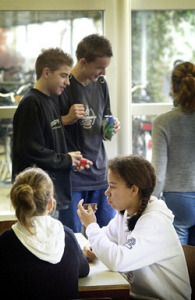The Truth (I’m a girl, I’m smart and I know everything) is now in all major bookstores in China in an English/Chinese version. Here is the beautiful cover. The title in China is: How an American girl grows up.
Category Archives: teens
Fun at Girl’s Night Out at Brielle School and the Girls Club in Manasquan School.
Why as a positive psychologist I chose to write fiction: The Truth (I’m a girl, I’m smart and I know everything)
 Lots of time people ask me why I started to write fiction as a positive psychologist. It is a good question. I started writing fiction because I wish to communicate information about how to grow up safe and strong to kids and their parents in a way that they can HEAR me. Lots of time we have great information to share, but nobody takes it in. Why? Sometimes it is too dry, sometimes the timing is off, sometimes it is the speaker”s manner. So to avoid all of those potential set-backs I have chosen fiction. The information is not dry! It is exciting and yet familiar to all of us. All of us were 10, 11 and 12 once. I don”t use my voice, but the voice of a girl who we fall in love with from the first page when she talks about her crush. And I know the timing is right, as every year their are millions of kids getting a year older who have universal concerns about their feelings, their friendships, crushes, bullying, home life, etc.
Lots of time people ask me why I started to write fiction as a positive psychologist. It is a good question. I started writing fiction because I wish to communicate information about how to grow up safe and strong to kids and their parents in a way that they can HEAR me. Lots of time we have great information to share, but nobody takes it in. Why? Sometimes it is too dry, sometimes the timing is off, sometimes it is the speaker”s manner. So to avoid all of those potential set-backs I have chosen fiction. The information is not dry! It is exciting and yet familiar to all of us. All of us were 10, 11 and 12 once. I don”t use my voice, but the voice of a girl who we fall in love with from the first page when she talks about her crush. And I know the timing is right, as every year their are millions of kids getting a year older who have universal concerns about their feelings, their friendships, crushes, bullying, home life, etc.
Let”s take a look at The Truth (I”m a girl, I”m smart and I know everything):
Feeling safe to communicate feelings and thoughts, no matter how personal and/or negative, rather than acting them out, is very important in child and adolescent development.
vThe Truth helps move girls, tweens, teens and their families closer to honest communicating. Every page brings to light feelings and thoughts so universal in nature that almost any page can be used to stimulate family members moving toward a more honest and open place with each other.
v The Truth gives a platform for kids to work through negative feelings about conflict and gives parents a new way of seeing conflict from the vantage point of how it affects their kids.
vThe Truth helps to prevent “mean girls” from developing by showing tweens how to express feelings using words, rather than anger or violence.
v The Truth helps girls see that they are not alone, by being able to so easily identify with the “girl” who is sharing her most personal feelings and thoughts with them directly, via diary form. If Mom also reads The Truth and shares more of her thoughts and feelings while also listening to her daughter”s “real” voice, than a family correction will be made and indeed, the girl will be less alone
vThe Truth also helps kids come to terms with growing up in a less than perfect world. The “girl” is able to do this using many skills that the reader can emulate, such as finding ways to hold on to the best of herself, even as she comes to terms with a world and a set of parents that are less than perfect.
Listening to Our Daughters
Listen to Dr. Barbara speak on Really Listening to Our Daughters Manasquan_Public_Library_Workshop_33009.wav
Mother-Daughter Book Club in Manasquan, New Jersey
I’ve been talking so much about my new book. But they say a picture is worth a thousand words, so I thought all of you would enjoy seeing me in action with my book. Here I am with the girls from the Mother-Daughter Book Club in Manasquan, New Jersey. One of the girls, April, had read my book The Truth (I’m a girl, I’m smart and I know everything) this summer and recommended the book.
As you can see by our smiling faces, it was a wonderful night. I was so happy that all the mothers and daughters had read the book and were ready to discuss school, social, family and communication issues brought up in the book. See the paper heart necklaces I am wearing? Each of them has on it a question that April had prepared so we would have plenty to talk about.
Here is a sample of several of the questions: “What are five things you promise to do when you grow up? How would you react if your mom told you you’re too young for a bra but you wanted one? Do you think teachers have an affect on kids emotions? explain…”
The more I work with The Truth I realize how different from other books it is as an educational and motivational tool. The kids fall in love with the girl who keeps such a truthful diary. They read it as fiction. But it opens up so many doors for education, communication and helping girls develop their true potential.
That night the mothers, girls and I could have talked for hours and hours. We did talk for over 1 1/2 hours, but we had to stop for luscious cupcakes and brownies that the kids had made!
Tips to Help You Communicate With Your Teen
 Today I had the pleasure of discovering a wonderful blog, www.wearyparent.com with a great article, entitled 9 Tips to Help You Communicate With Your Teen. I left a message emphasizing how great the list is, and also mentioned how important it is to be a role model to your teen. It is not only what we say, and how well we listen, but how we live our own lives. That means it does matter how gracious we are, how kind we are, whether we are generous of spirit and eager to not hold grudges or be petty. It does matter what we say, but often it matters just as much how we say it. Can we cushion a criticism with some sweet honey? Can we wait until the right moment to say something personal when no one else is listening. It all matters! If you think back to being a teen, can you remember when someone was gentle in what she had to say, instead of rough? Or when someone was extra kind? I can and those people are still with me today. I’ll say ‘thank you’ right now to Mr. Masters who made me feel good playing the violin, even though I really wasn’t very good at it, and Mr. and Mrs. Sylvester who always knew how to boost up my spirits when some boy I thought I was in love with, had dropped them down so low, I could hardly muster the strength to answer the phone.
Today I had the pleasure of discovering a wonderful blog, www.wearyparent.com with a great article, entitled 9 Tips to Help You Communicate With Your Teen. I left a message emphasizing how great the list is, and also mentioned how important it is to be a role model to your teen. It is not only what we say, and how well we listen, but how we live our own lives. That means it does matter how gracious we are, how kind we are, whether we are generous of spirit and eager to not hold grudges or be petty. It does matter what we say, but often it matters just as much how we say it. Can we cushion a criticism with some sweet honey? Can we wait until the right moment to say something personal when no one else is listening. It all matters! If you think back to being a teen, can you remember when someone was gentle in what she had to say, instead of rough? Or when someone was extra kind? I can and those people are still with me today. I’ll say ‘thank you’ right now to Mr. Masters who made me feel good playing the violin, even though I really wasn’t very good at it, and Mr. and Mrs. Sylvester who always knew how to boost up my spirits when some boy I thought I was in love with, had dropped them down so low, I could hardly muster the strength to answer the phone.
Enjoy four of the tips and then go to www.wearyparent.com to read the rest of the tips!
-
Give her your undivided attention. We’re parents. We’re busy. But we need to make time for our kids. Sometimes it feels like they’ve gotten so independent they don’t need us anymore. But they do. Put the Blackberry away. Shut down your laptop and just concentrate on your teen.
- Fight fair. Don’t bring up the past. Don’t say, “You always do this. Remember in the 2nd grade when I couldn’t get you to…” That’s not going to help anything. Stick to the issue at hand. Present your case. And then really listen to your teen’s rebuttal. Try to be understanding, but still be firm.
- Share your day. We all know what the answer to “how as school today?” So instead of asking that question, tell your teen about your day. When you open up, it may get him to open up. Tell him about a funny conversation you had with a co-worker. Or about somebody that really ticked you off that day and see if he has any advice. Get him talking.
- Don’t force him. Ask “Do you want to talk?” and if the answer is “no” then respect that. Sometimes teens (and sometimes parents) just want to be left alone. But let him now you are there if and when he is ready to talk.
